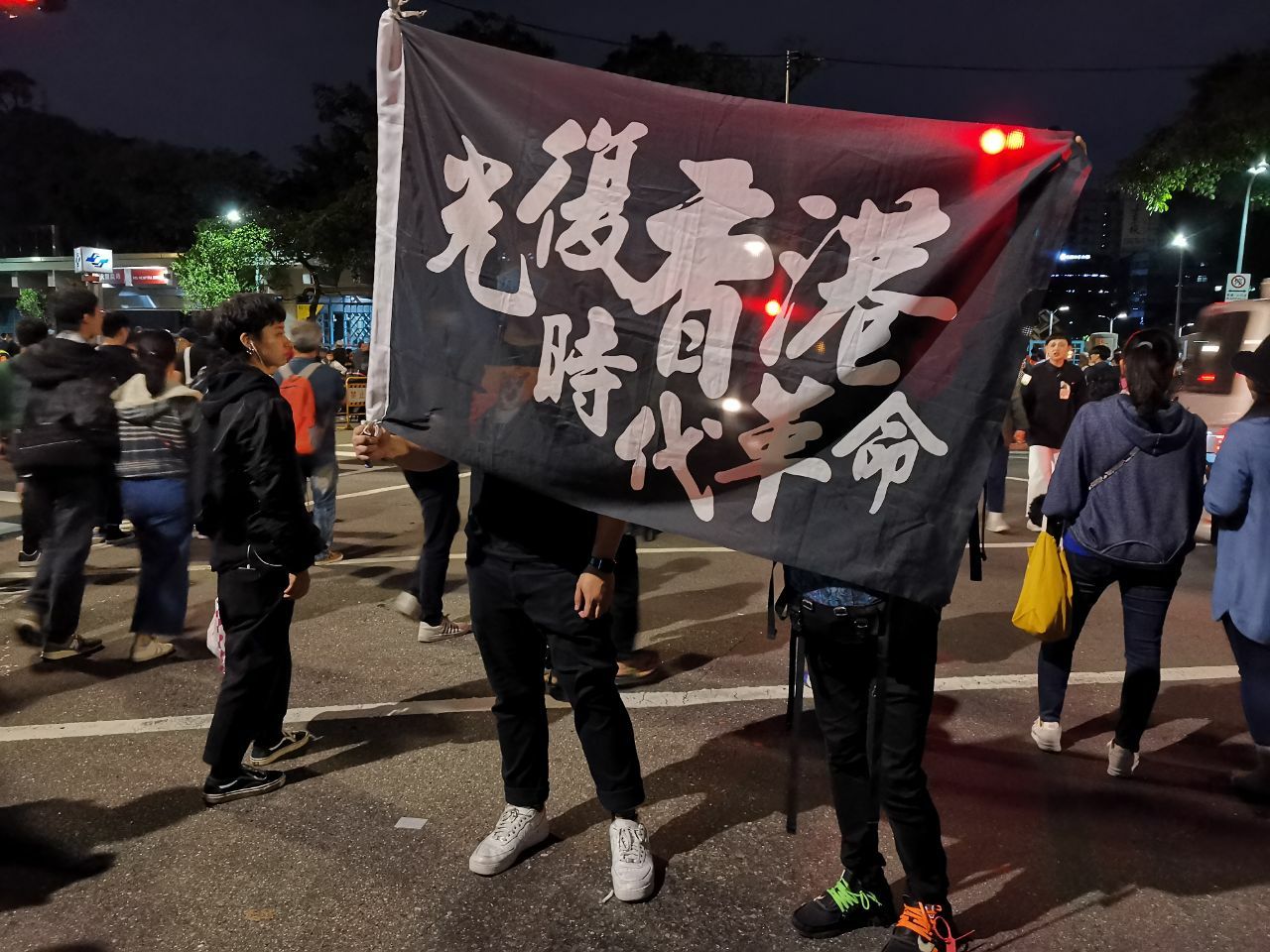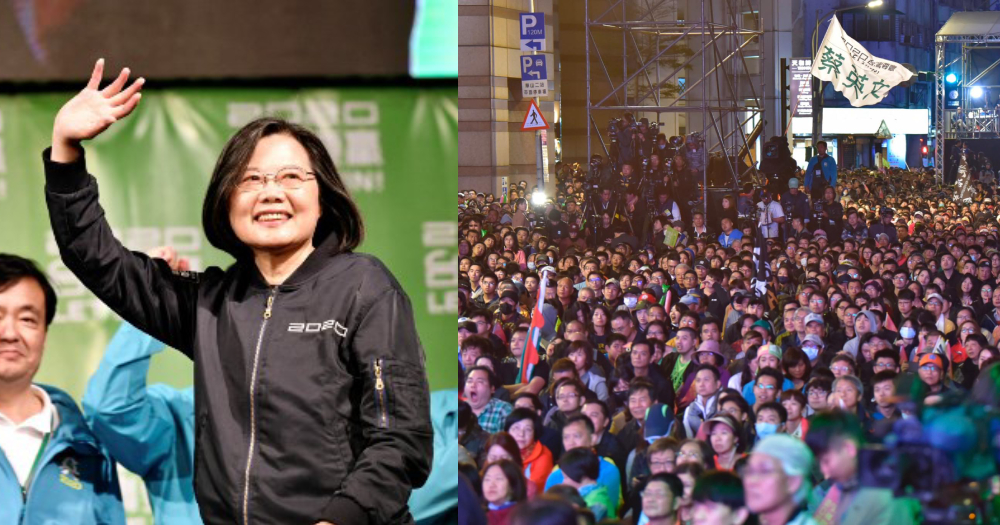Taiwan's President Tsai Ing-wen has been re-elected in a landslide victory on Saturday, Jan. 11,
Her victory arguably came about after she latched onto the opportunities presented by Chinese President Xi Jinping's reunification rhetoric.
This has been topped off by the unceasing Hong Kong protests, even if she denied making use of the latter.
Stunning defeat in 2018 local elections
Tsai's reversal in her political fortunes is significant, considering how far she has come.
In November 2018, when she was forced to step down as the chair of the Democratic Progressive Party (DPP), following her pro-independence party's stunning electoral defeat.
The future of her political career had appeared to hang in the balance, as the party lost seven out of 13 cities and counties.
This included losing its traditional stronghold of Kaohsiung to Kuomintang in the local elections.
Here's how she managed to turn the tide.
Xi's ramping up of reunification rhetoric aids Tsai
Tsai has constantly warned of the danger posed to Taiwan by China.
She has also pushed strongly for Taiwan to be less economically dependent on China, launching the "New Southbound Policy" to forge closer ties with Southeast Asian countries.
Following Chinese President Xi Jinping's 2019 New Year's speech, in which he urged Taiwan to reunite with mainland China, Tsai saw a revival in her popularity after she reiterated that Taiwan's sovereignty will never be compromised.
Tsai's ratings improved after she pushed back against Xi
In fact, Xi's push for the self-ruled island to rejoin the mainland fold has helped Tsai gain momentum after the DPP's crushing defeat.
According to poll results from a telephone survey published on Dec. 21 by the Taiwan Public Opinion Foundation, 34.5 percent of the 1,000 respondents expressed their support for Tsai, which was an increase of 10 percentage points since the conclusion of the November elections, AP News reported.
Fan Shih-ping, a political science professor at Taiwan Normal University, told South China Morning Post that Xi's Taiwan rhetoric has helped Tsai bounce back, as "voters admired her courage in safeguarding Taiwan's sovereignty".
Beijing's interference in upcoming election not helping
Tsai regaining her popularity has also been arguably boosted by reports that Beijing has been meddling in Taiwan's election.
Such allegations are strengthened by the testimony of self-proclaimed Chinese defector Wang Liqiang, who claimed he was ordered by Beijing to meddle in Taiwan's election in favour of the KMT.
Firm support for pro-democracy protests in Hong Kong helped Tsai
But perhaps the seven-month-long protests in Hong Kong have helped contribute the most to the revival in Tsai's popularity.
Her show of solidarity with the pro-democracy protests in Hong Kong has helped improve her approval ratings among certain groups of Taiwanese who commiserate with the protesters, or who might be fearful of Beijing's encroachment on their way of life and civil liberties.
a very conspicuous and familiar “liberate Hong Kong, revolution of our times” flag right at the centre.
— Jeffie Lam (@jeffielam) January 11, 2020
a very wise choice of picture
#Taiwan2020 #hongkongprotests https://t.co/bnpmm96ixY
The 2014 Occupy Central movement has also previously invoked fears among the wary Taiwanese, even leading some to say "Today Hong Kong, tomorrow Taiwan".
Taiwan looking at Hong Kong closely
The protests in Hong Kong also serve as a valuable lesson for those opposed to reunification with mainland China, reminding them of what would happen should the island come under China's control.
Detractors of the "one country, two systems" arrangement said its failure in Hong Kong means it should never be replicated in Taiwan.
To counter this narrative, the Chinese Communist Party has strongly pushed for the framework to be used for the "wayward province" to return to the "motherland's" embrace.
For some Taiwanese, the Beijing-backed Hong Kong government's handling of the protests might have also strengthened anti-Beijing sentiment, and pushed them towards domestic parties deemed to have taken a sterner stance towards Beijing.
 Tsai's supporters at a rally in Taipei on Friday, Jan. 10, holding up a banner that says "Glory to Hong Kong, Revolution of Our Time", the protest slogan used in the Hong Kong protests. (Image by Daniel Ho)
Tsai's supporters at a rally in Taipei on Friday, Jan. 10, holding up a banner that says "Glory to Hong Kong, Revolution of Our Time", the protest slogan used in the Hong Kong protests. (Image by Daniel Ho)
https://twitter.com/WilsonLeungWS/status/1215893413230338048
Voters perceive Tsai's policies differently now
Therefore, while Tsai's policies of rejecting China were questioned by many before the November 2018 elections for either being too distant from China to develop strong economic ties, or being too soft in standing up to Beijing's military and diplomatic pressure, voters can be said to be more accepting of her policies.
Speaking to Nikkei Asian Review, Sean King, a scholar at the University of Notre Dame Liu Institute for Asia & Asian Affairs, went as far as saying that "Xi, and underling Carrie Lam, have effectively gifted Tsai a comeback from the would be political dead".
KMT: DPP making use of Xi and Hong Kong
The KMT, however, has criticised such a strategy, saying in a separate Nikkei Asian Review report that the DPP's improving position over the past few months comes from just making use of Xi's speech, and the Hong Kong protests as "campaign weapons".
KMT's Beijing-friendly stance
As for the KMT's friendlier stance towards Beijing, critics have denounced it as saying Han would be unable to defend Taiwan's interests sufficiently in the face of increasing pressure from Beijing.
Han, whose dramatic rise into a political star was termed the "Han Wave", has advocated closer ties with China, but rejects the "pro-China" label he said the DPP was to be blamed for.
However, when asked which country poses the greatest threat to Taiwan during the presidential debate on Sunday, Dec. 29, Han avoided answering the question directly.
Han was also accused by Wang that he had received money from Beijing to fund his campaign.
He has since vehemently refuted the allegation, saying he would drop out of the race should he be found to have even accepted NT$1 (S$0.05), Taiwan News reported.
China favours Han
Beijing can also be said to favour Han over Tsai.
An overwhelming show of support for Han in the form of online comments that helped him emerge victorious in the Kaohsiung mayoral election were reported to have originated in China.
Cross-strait relations an issue this election
Cross-strait relations had taken centre stage at the presidential debate, with both Han and Tsai taking pot shots at each other for their cross-strait policy.
Since Tsai took office in 2016, and refused to reaffirm the one-China principle, Beijing has suspended official exchanges and talks with Taiwan.
Tsai's re-election is set to invite even sterner action from Beijing, which has stepped up its influence internationally to further isolate Taiwan diplomatically since her election in 2016.
Cross-strait issue a focus in past elections too
This is not the first time that cross-strait issue has featured heavily in an election.
Tsai's landslide victory in 2016 was largely seen as riding on voters' disapproval of the KMT's pro-China policies then, in addition to disappointment with the economy under former president Ma Ying-jeou.
Ho Szu-yin, a political science professor at the National Chengchi University in Taipei, said this election is simply repeating what has happened in the past, Nikkei Asian Review reported.
When it comes to Taiwan's presidential election, he said the DPP has "always won on nationalism", while the KMT has "always won on economic affairs".
Taiwan's economy strong under Tsai
Taiwan's strong economy is not hurting Tsai's campaign either.
Despite Beijing's pressure campaign, Taiwan's economy boasts of the lowest unemployment in decades, and a strong export growth, AFP reported.
The U.S.-China trade dispute has benefited Taiwan as well, leading many Taiwanese companies to move production back to Taiwan from China.
More on Taiwan:
Top image adapted via Sam Yeh/AFP & Tsai Ing-wen's Facebook
If you like what you read, follow us on Facebook, Instagram, Twitter and Telegram to get the latest updates.
